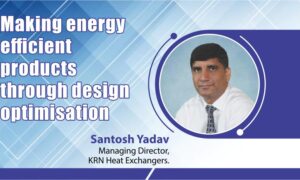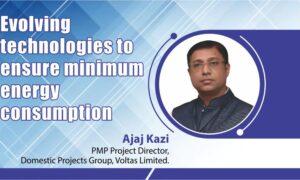Chilled water centralised cooling systems are very well ventilated and designed with suitable air handling equipment and distribution channels to include fresh air, thus maintaining IAQ for better protection against propagation of the coronavirus.
Abhishek Khullar, Regional Manager – North & East, Dunham-Bush India
Malaysia-based HVAC company Dunham-Bush is present in Indian market for decades. In 2018, looking at the opportunities in this market, the company established its 100 percent subsidiary DB-AIRE India Pvt Ltd. In an interview with Subhajit Roy, Dunham-Bush India’s Regional Manager for North and East Abhishek Khullar talks about the Indian subsidiary’s contribution to the group’s business. He also explains the emerging trends in the HVACR industry in COVID-19 era.
Dunham-Bush celebrated its 125 years of existence in 2019. Could you take us through the journey of your company in India?
We are very proud of the fact that we have completed 125 years of our existence in the field of HVAC and especially applied products. Dunham-Bush as a company has not just progressed over the years but also has produced world-class technologically advanced products for the HVAC industry. Dunham-Bush has been present in Indian market since 1994 through distributor network and looking at ever-growing Indian market decided to invest in India and as first step opened its subsidiary in 2018 at Gurgaon. Post that we have incorporated a private limited company here in India to attend to customer needs and provide them prompt after-sales services with a customer-first mindset. The response to Dunham-Bush opening its direct office in India region has got a very good welcome with various stakeholders like consultants, contractors, and end-customers that has resulted in very good business growth in the last 2 years.
How significant is the contribution of the Indian subsidiary to your group’s business?
India has always been a focused market for Dunham-Bush for more than a decade, we had been focusing on providing and meeting the need of Indian customers. India is an important growth driver for the company’s vision in Asia and South Asia region and to strengthen our business in India we have made long-term systematic investment plans in the country. Our growth in the Indian market has been in double-digits from the past 2 years which has further strengthened the company’s vision towards Indian business.
Lots of development activities are happening in India. How do you see the opportunity for the HVACR business?
Surging infrastructure spending in India buoyed the market growth and Indian HVAC market is expected to reach USD 5.9 billion by 2024, registering a CAGR of 7 percent during the forecast period. India’s per capita space cooling energy consumption is below average than the developed countries and a few developing countries. We see a very promising future for the Indian HVACR business in the coming years and have already started preparing to be part of the growth.
Tell us about your preparedness in terms of grabbing more market share.
To increase the market share and be part of the growth story of HVACR industry in India, we have increased our sales and service network across the country. In last 2 years, we have developed 4 independent service hubs (North, East, West and South). Similarly, we now have our own sales team across 4 major cities of India and have dealers in Tier 1 and 2 cities so that we can address customer needs timely and effectively.
Dunham-Bush has always been known for its chiller range in India, however, we produce many other HVAC products that are sold globally and have good recognition. We now have launched our complete product basket to Indian customers to choose from the likes of rooftops, VRF, air-cooled or water-cooled packages, precision air conditioners, and thermal ice storage solutions.
What are the trends being witnessed in the HVACR industry in this COVID-19 era?
COVID-19 has increased the need to strengthen the healthcare segments further and healthcare was a government focused area in 2019-20 and we have seen an increase in the number of AIIMS and regional hospitals being built. The need to have a strong healthcare infrastructure in tier 2 and 3 cities has emerged further in the COVID-19 era. The point of focus now is indoor air quality (IAQ) with the help of using a better ventilation system of adding fresh air in the system and using products like Bipolar Ionization (Plasma) and UVGI (Ultraviolet Germicidal Irradiation) in air distribution system.
Is it safe to use chilled air conditioning systems for HVAC in commercial and public infrastructure buildings in the times of COVID-19?
Chilled water air conditioning systems are safe – please don’t fall for rumours. As we all know through various researches published, the virus may not be airborne but if a person is standing within 1-2 metres of an infected person, they can be infected by breathing-in droplets sneezed or coughed out or exhaled by them. Humidity also affects the spreading of the virus. At lower humidity, the droplets evaporate fast and travel a longer distance.
Centralised chilled water systems are safe and beneficial use in commercial applications and public spaces because the primary cooling media is in a closed cycle and doesn’t come directly in contact with the occupants. Chilled water centralised cooling systems are very well ventilated and designed with suitable air handling equipment and distribution channels to include fresh air, thus maintaining IAQ for better protection against propagation of the coronavirus.
We recommend the use of zonal units such as fan coil units (FCUs) and cassettes which ensure that there is no mixing of the air from other areas, making it safer for the occupant with improved IAQ.
Cookie Consent
We use cookies to personalize your experience. By continuing to visit this website you agree to our Terms & Conditions, Privacy Policy and Cookie Policy.















